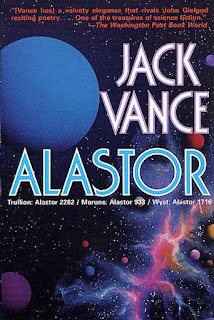Jackson Brodie has appeared in six novels by Kate Atkinson so far; some people have called that a mystery series, since Brodie is a private investigator, of a sort. And the mystery audience has embraced those books, but they're not really mysteries. They're not really thrillers, either.
But they are definitely crime fiction, that larger and more encompassing category that works the way "speculative fiction" does on the other side of one genre divide: marks out a large territory of fiction that has smaller kingdoms within it, with vague but understandable overall boundaries.
Crime fiction includes mysteries, both cozy and hardboiled, and thrillers, and noir, and other, odder things - it's the whole set of stories about people who break the law, who do horribly transgressive things (usually but not always murder), and what happens to them and the people around them. Most of the pieces of crime fiction are renormative at their core, but it's not required in the whole territory.
Atkinson's Brodie books, at least up to this fourth one Started Early, Took My Dog, are told in multiple third-person perspective, mostly take place over a short period of time - usually divided into sections, each basically one day, with major flashbacks into important moments or periods in the decades past - and center around crimes. Brodie is generally not investigating the central crime or crimes, and he's not the motivating center of the book; I tend to think he's an important viewpoint, and is changed by each case, but they're not essentially his stories.
The first three were Case Histories, One Good Turn, and When Will There Be Good News?
This is the book about kidnapping, or maybe abduction. It has three major narrators, and a few secondary ones.
Jackson is in Yorkshire, where he was born, and where he hasn't been back for a while, and where he'd planned never to return. He's trying to trace the background of Hope McMaster, a New Zealand woman who was born there and adopted, somewhat illegally or secretly, in the mid-1970s. Early in this book, he "liberates" a small dog from its thuggish, abusive owner. That's the third of the three major abductions.
Tracy Waterhouse is a retired police detective, never married, alone and mostly resigned to it, working as the head of security for a local mall. On that same day, she sees a horrible woman mistreating a small child - she knows the woman, a prostitute, from her years on the force, and is mildly surprised that any children are still in her care, since she's had a number taken away from her. She "buys" the child, Courtney, since she had an envelope full of money on her for a home-renovation job. She never got to be a mother, but she wants to take care of this child, and her motives are about as pure and positive as they can be.
That's the second abduction. The first happened back in 1975.
The third major narrator is Tilly, an elderly actress working on the soapy Collier TV show in the region - doing badly at it as she starts to sink under the weight of impending dementia, forgetting bits and pieces of today as her mind focuses on the past. [1] She doesn't abduct anyone, but is a witness of the horrible mother abusing Courtney in the mall. She seems to be an entirely separate thread for a lot of the novel, but she will be there in the end.
I won't spoil the minor narrators, who span the present day (about 2010) and 1975.
Jackson goes various places in Yorkshire, tracing leads to his client's past, and finding more missing people and slammed doors and implied threats of violence than seems plausible. Tracy upends her entire life to keep Courtney safe and give her the life she should have, running away from her job and trying to figure out how they can get away and find a safe, stable place for the two of them. Tilly tries to do her work on Collier, while her thoughts keep circling elements of her younger life in the '60s.
And the book keeps flashing back to 1975, when a prostitute was murdered and a small child found, emaciated, in her apartment with her dead body three weeks after her death. In the end, all of the abductions, all of the major and minor narrators, are linked, and we learn who Hope McMaster was, how she came to be "Hope McMaster" in New Zealand, and what will happen to Tracy and her new child. (And to Jackson and his dog, which is the least important of the strands.)
Atkinson is inherently a literary writer: she writes brilliantly and incisively, getting right into the heart of her character's heads and laying bare their thoughts and feelings and fears. She has a fascinating mastery of tone, here as in her other novels: she can be wryly funny and then show dark horrors within the same paragraph, back and forth again and again. This is a magnificent book in a magnificent sequence by one of the best writers working today.
[1] I started reading this novel on the day of the memorial service for my mother, who had progressive dementia over her last decade. I almost put the book down, and some parts of it were really difficult to read: I say that in case I skip over anything important to do with Tilly.
















